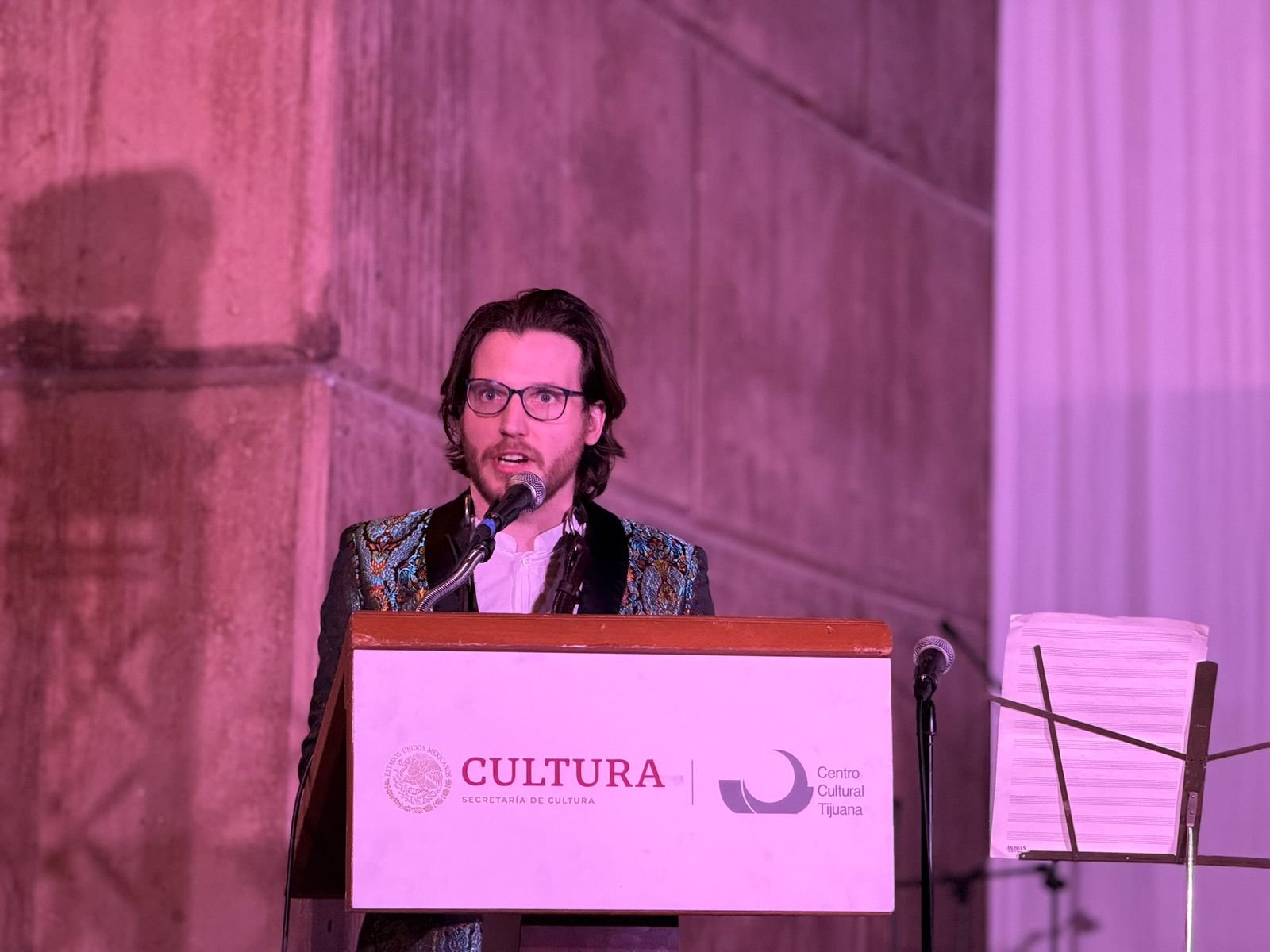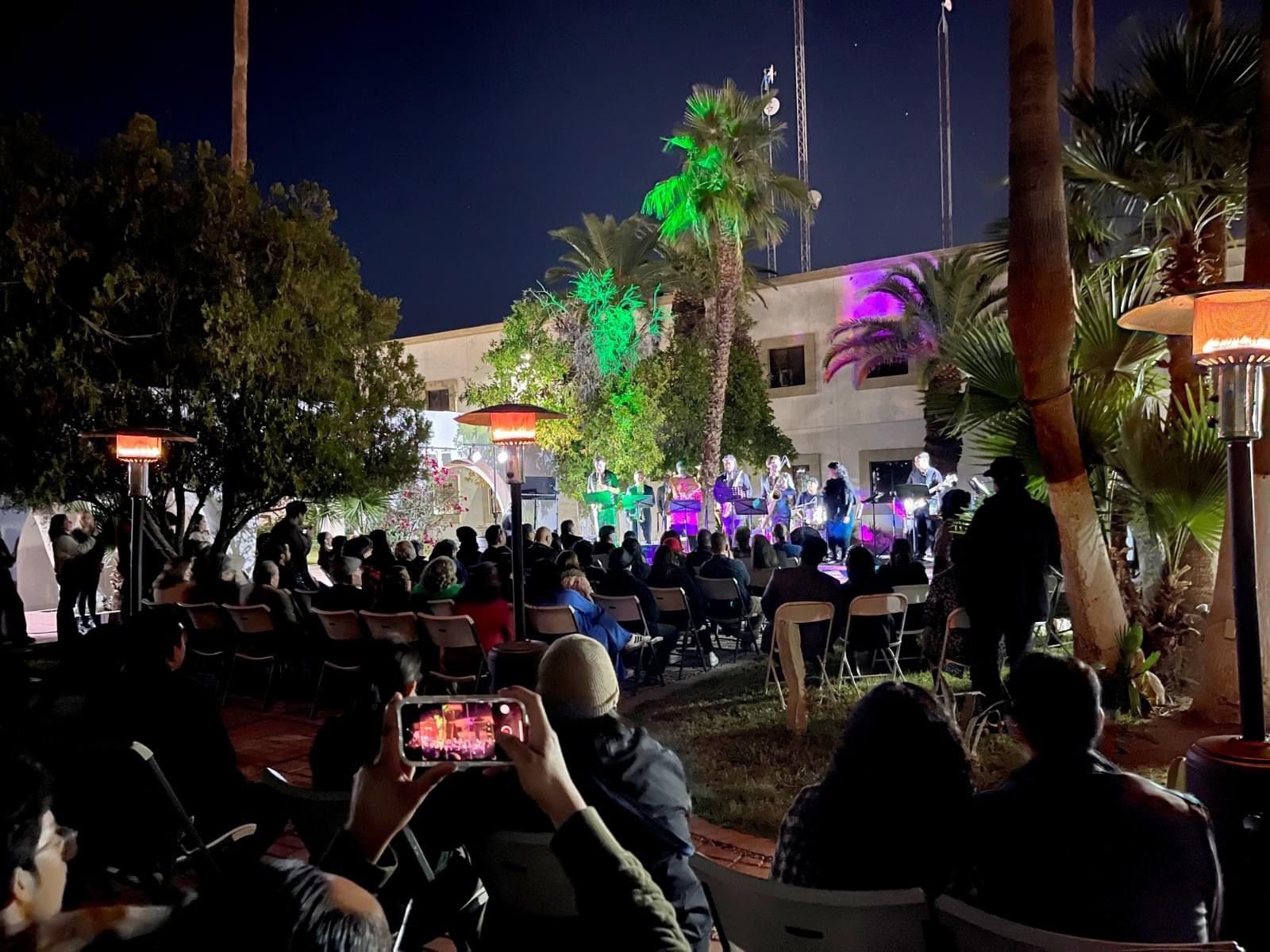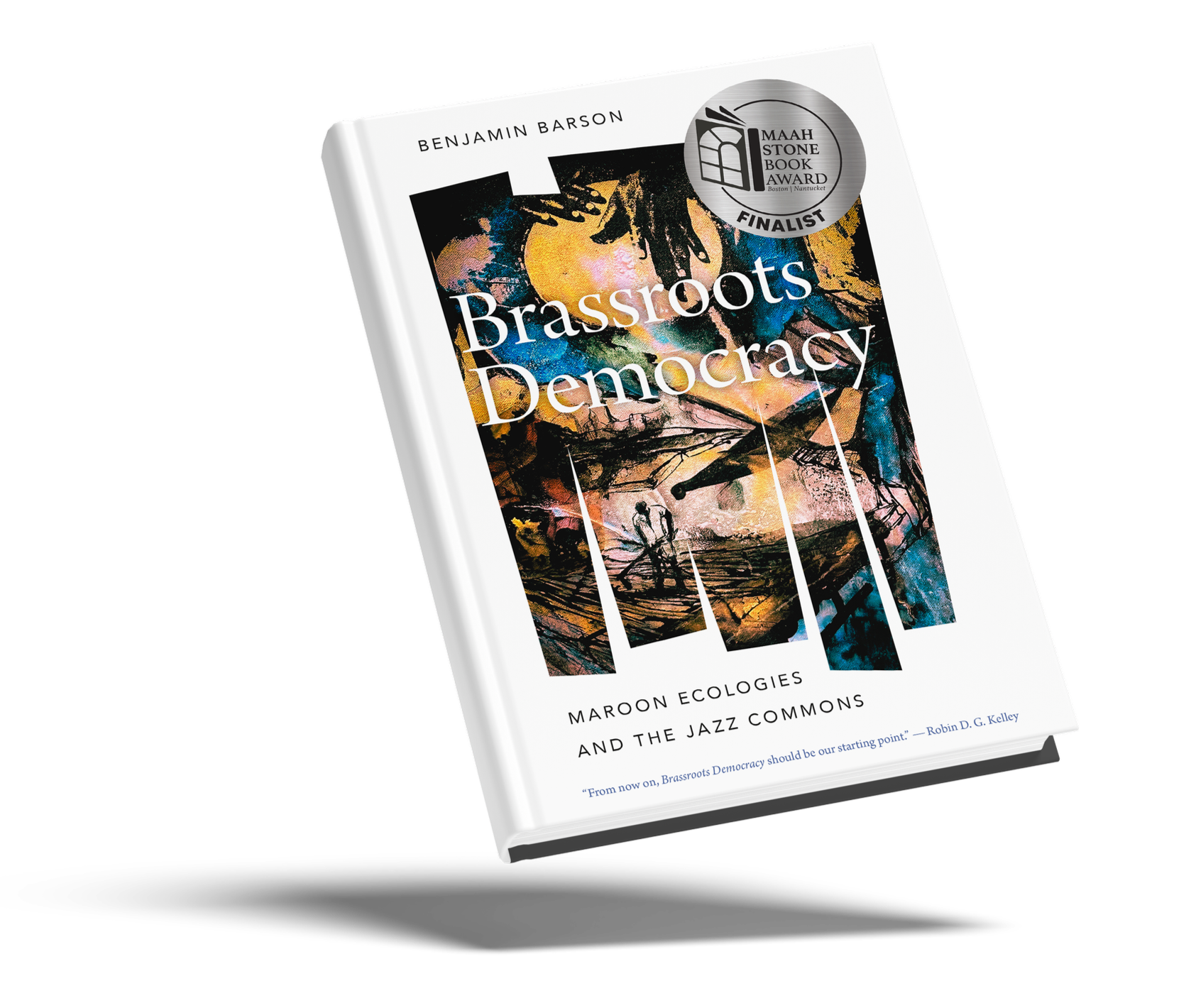Historian, Musician, Musicologist, Composer, and Educator
May we hear new worlds.
Benjamin Barson is a composer, historian, and musicologist. He is an assistant professor of music at Bucknell University. His book Brassroots Democracy (Wesleyan University Press, 2024) was a finalist for the Mususem of African American History’s Stone Book Award and was named a “best book of 2024” by PopMatters. His research thinks through jazz as an Afro-Atlantic art form deeply tied to the counter-plantation legacies of the Haitian Revolution and their echoes in Radical Reconstruction. He received his PhD in Music from the University of Pittsburgh and recently completed a Fulbright Garcia-Robles postdoctoral fellowship at the Universidad Autónoma de Baja California in Mexicali, Mexico.
Barson’s research rethinks migration, agency, and cultural resistance, and has published on topics ranging from the musical cultures of Chinese indenture in the late nineteenth century United States South (The Cargo Rebellion, PM Press, 2023) to the legacy of Haitian migrants in early Louisianan blues (in The Routledge Handbook to Jazz and Gender, 2022). In addition to his academic and scholarly output, Barson is the recipient of the 2018 Johnny Mandel Prize from the ASCAP Foundation for this distinguished work as a jazz saxophonist and composer.
Barson, disturbed by the incredible oppression wrought by white supremacy and the destruction of global ecology, employs a musical practice that draws from the deep well of revolutionary musicians within the jazz tradition, often composing through a collaborative process with activists and social movement leaders in the Global South. His work Mirror Butterfly: The Migrant Liberation Movement Suite (2018) was hailed as “Fully orchestrated and magnificently realized” (The Vermont Standard) as well as “a call to action” (I Care if You Listen). His teaching encourages students to consider musical aesthetics and their associated production practices through a holistic, interdisciplinary approach rooted in methodologies developed by scholars in Africana studies, musicology, cultural studies, and Atlantic History from below.




Recent Publications
Brassroots Democracy
Maroon Ecologies and the Jazz Commons
Weslyean University Press, 2024
Finalist for the MAAH’s Stone Book Award
Brassroots Democracy recasts the birth of jazz, unearthing vibrant narratives of New Orleans musicians to reveal how early jazz was inextricably tied to the mass mobilization of freedpeople during Reconstruction and the decades that followed. Benjamin Barson presents a "music history from below," following the musicians as they built communes, performed at Civil Rights rallies, and participated in general strikes. Perhaps most importantly, Barson locates the first emancipatory revolution in the Americas—Haiti—as a nexus for cultural and political change in nineteenth-century Louisiana. In dialogue with the work of recent historians who have inverted traditional histories of Latin American and Caribbean independence by centering the influence of Haitian activists abroad, this work traces the impact of Haitian culture in New Orleans and its legacy in movements for liberation.
Brassroots Democracy demonstrates how Black musicians infused participatory music practice with innovative forms of grassroots democracy. Late nineteenth-century Black brass bands and activists rehearsed these participatory models through collective performance that embodied the democratic ethos of Black Reconstruction. Termed "Brassroots Democracy," this fusion of political and musical spheres revolutionized both. Brassroots Democracy illuminates the Black Atlantic struggles that informed music-as-world-making from the Haitian Revolution through Reconstruction to the jazz revolution. The work theorizes the roots of the New Orleans brass band tradition in the social relations grown in maroon ecologies across the Americas. Their fruits contributed to the socio-sonic commons of the music we call jazz today.
The Cargo Rebellion: Those Who Chose Freedom
Jason Chang, Ben Barson, and Alexis Dudden • Illustrated by Kim Inthavong (PM Press, 2023)
Bold and exciting, this graphic tale of mutiny on the high seas tells the true story of the Robert Bowne Rebellion of 1852—in which indentured Chinese men overthrew their captor and slave trader the American businessman Captain Lesley Bryson. This stand against American capitalism and the global economy that profited from exploitation and death. This often-overlooked part of history is brought to life through lively prose, meticulous research of archival material, by Ben Barson, Jason Oliver Chang, Alexis Dudden, with wonderful graphic illustration by Kim Inthavong. The Cargo Rebellion does lasting justice to the memory of the hundreds of thousands of Chinese and South Asian workers were indentured in the “coolie trade,” in hope of building a movement where human slavery can be abolished forever.
“Sounding Affective Consensus New Orleans’ Black Longshoremen Union and the Strike as Musical Affect, 1872-1907”
in the Journal of Extreme Anthropology, Vol. 7 No. 1 (2023): Global Perspectives on Music, Affect and Politics. (Link)
This paper explores how New Orleans Black dockworkers created affective communities by utilizing brass bands, as evidenced by newspapers, union records, and testimonies from jazz musicians. In an attempt to weave together congruences between ‘history from below’, the affective turn, and theorists of the Black radical tradition, I argue that the nation’s largest Black Union in the late nineteenth century, the Longshoremen’s Protective Union Benevolent Association of New Orleans, successfully intervened in this port city’s economy by building a mass movement. They did so not only because of their strategic location in relation to capital and a modernizing logistics industry, but also because these dockworkers successfully struggled to control the affective modalities and temporalities of daily life. It was in this latter strategy that polyphonic brass bands and collective singing traditions played important roles in struggling for bodily autonomy and new social relations formulated in opposition to the profit motive. I coin this felt solidarity ‘affective consensus,’ which was a consensus-based decision-making process activated by agreed-upon musical conventions. Its power lies in its historical connections between democratic traditions of assembly, workplace struggles, and forms of participatory music making--all emblematic of late nineteenth-century Black New Orleans.
The Routledge Companion to Jazz and Gender
Edited By James Reddan, Monika Herzig, Michael Kahr (Routledge: 2022)
My essay ““I've Got the Haitian Blues”: Mamie Desdunes and the Gendered Inflections of the Common Wind””" is published in this volume. Mamie Desdunes (1881–1908) was an important pianist and vocalist in New Orleans who made a profound contribution to the development of early jazz and blues. Her song “2:19 Blues” is an incisive critique of the intersecting regimes of gendered capitalism and the human cost of prostitution. This song had an immense resonance within the musicians’ community and their audiences. In this chapter, I challenge this song’s erasure from the dominant jazz historiography and consider how Mamie Desdunes’s multiple identities—as a blues woman, a Haitian woman, a mixed-race Black woman, and a woman connected to the sex industry—are fundamental for how we understand jazz-blues. I trace Mamie Desdunes’s contributions through a variety of lenses: through her family’s history, through the lyrical content and musical properties of her famous composition, and her work within the political economy of Storyville. I will provide an analysis of Mamie Desdunes in order to highlight the importance of blues women and sex workers in shaping jazz’s multiple meanings in turn of the century New Orleans, as well as the influence of Haitian-descended musicians of color in early jazz culture.
The Routledge Handbook on Ecosocialism
ed. Leigh Brownhill, Salvatore Engel-Di Mauro, Terran Giacomini, Ana Isla, Michael Löwy, Terisa E. Turner (Routledge: 2022)
My essay ““You Can Blow Your Brains Out and You Ain't Getting Nowhere”: Jazz, collectivism, and the struggle for ecological commons in Louisiana's sugar parishes” appears in this volume. In this chapter I consider jazz as the product of an ecosocial set of relations that proposes novel forms of ecosocialism. I posit that New Orleans jazz cannot be understood apart from the ecological politics of the enslaved workforce of Louisiana’s sugar plantation economy. By interrogating the intersection of the politics of sound and the politics of land, I hope to show how nineteenth-century Black activists and musicians anticipated the ecological crisis which is now unfolding globally and how mass music making has served as a check against the unrestrained power of capital.
Black Power Afterlives: The Enduring Significance of the Black Panther Party
ed. Diane C. Fujino and Matef Harmachis (Chicago: Haymarket Books, 2020)
This volume includes my essay “Poetic Justice: The Dialectic Between Black Power Politics and Fred Ho’s Revolutionary Music.”" The concept of a shared “Afro Asian” tradition has received much attention in recent scholarship in both postcolonial studies and in cultural studies of American music. Fred Ho, a prolific baritone saxophonist and avant-garde jazz composer, is an important case study of a musician who worked at the intersections of Black American and Chinese-American culture. In addition to his musical career, Ho was a lifelong organizer who worked closely with core Black Power activists including Amari Baraka and Russell Maroon Shoatz. This essay explores Fred Ho’s musical works that expressed his inspired advocacy of the radical emancipatory vision expressed by the Black Panther Party, in particular by analyzing Ho’s 1999 composition The Black Panther Party Suite. It also explores Ho’s legacy as a radical educator and movement organizer, with an analysis of Ho’s DIY (do-it-yourself) benefits for imprisoned Black Panther Party activists. More broadly, the essay explores the influence of the Black Panther Party on Ho’s vision of a unified musical and activist practice and highlights the special significance of the Black Panther Party among the musicians of the Asian-American jazz movement. In doing so, I hope to further support a radically cosmopolitan and activist reading of Black American music.






